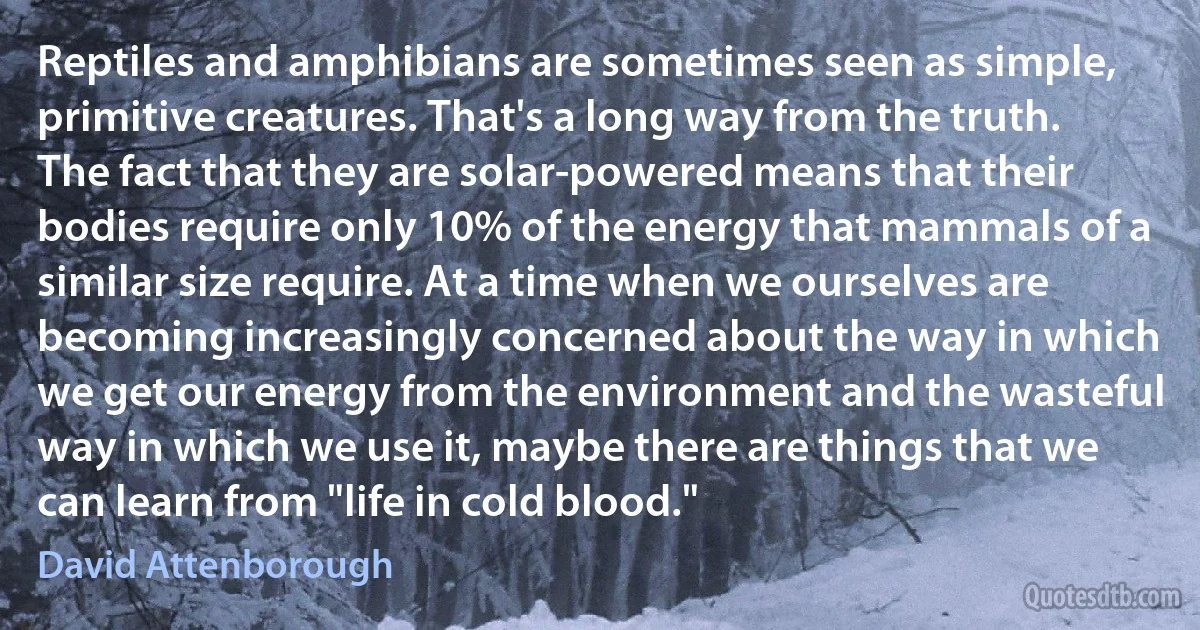Use Quotes - page 98
I'm very aware that this programme may be regarded as bleak or depressing - an increasing population with an ever decreasing supply of resources – but humans have capabilities that animals don't: to think rationally; to study; to plan ahead. The number of people on the planet depends on the personal decisions we each make regarding the number of children we have even setting aside the moral responsibility we have to protect other species, if we continue to damage our ecosystem, we damage ourselves. Its clear that we'll have to change the way that we live and use our resources. We're at a crossroads where we can chose to cooperate or carry on regardless. Can our intelligence save us? I hope so. m46s24-m47s15.

David Attenborough
Immensely powerful though we are today, it's equally clear that we're going to be even more powerful tomorrow. And what's more there will be greater compulsion upon us to use our power as the number of human beings on Earth increases still further. Clearly we could devastate the world. [... ] As far as we know, the Earth is the only place in the universe where there is life. Its continued survival now rests in our hands.

David Attenborough
The only thing I remember is ... he put a lot of urination scenes in Tromeo and Juliet. Too much of that. Other than that, I think he did a great job. It was his idea to put in the line, "What light through yonder plexiglass breaks?" That set up a stunt with plexiglass that almost blew me up. They used too much dynamite, or whatever they use for stunts like that.

Lloyd Kaufman
I no longer feel I'll be dead by thirty; now it's sixty. I suppose these deadlines we set for ourselves are really a way of saying we appreciate time, and want to use all of it. I'm still
writing, I'm still writing poetry, I still can't explain why, and I'm still running out of time.

Margaret Atwood
What Elizabethan playwrights learned from the Greek classics was not theories of insanity, but dramatic practice - that is, madness is a dandy theatrical element. It focuses the audience's attention and increases suspense, since you never know what a mad person may get up to next; and Shakespeare himself makes use of it in many forms. In King Lear, there's a scene in which one man pretending to be mad, another who has really gone mad, and a third who has probably always been a little addled, are brought together for purposes of comparison, irony, pathos, and tour de force acting. In Hamlet, there are two variations - Hamlet himself, who assumes madness, and Ophelia, who really does go winsomely bonkers. In MacBeth, it's Lady MacBeth who snaps.

Margaret Atwood
You have to have the courage to stand up for what you believe in – no matter how hard it is – as your beliefs make you who you are amid all the celeb madness. I'm a vegetarian and never wear leather or use products tested on animals. When I was just starting out I'd get a gazillion freebies thrown at me, so it was hard to know what contained what. Now, I've made sure that before I get to a photoshoot people know my stance on that.

Leona Lewis
In the struggles for the Islamic order, all means are permissible except one: crime. No one has the right to defile the good name of Islam by the uncontrolled and superfluous use of force. The Islamic community should once more confirm that justice is one of its keystones... Formula: the aim justifies the means has become the cause of numberless crimes. A noble aim cannot command unworthy means.

Alija Izetbegović
When I woke up, it was daylight. That is when I remembered that I had a father. During the alert, I had followed the mob, not taking care of him. I knew he was running out of strength, close to death, and yet had abandoned him.
I went to look for him.
Yet at the same time a thought crept into my mind: If only I didn't find him! If only I were relieved of this responsibility, I could use all my strength to fight for my own survival, to take care of myself...Instantly, I felt ashamed, ashamed of myself forever.

Elie Wiesel
Perhaps because of my fever, perhaps because of my lofty pain, I imagine that some one there is declaiming a great poem, that some one is speaking of Prometheus. He has stolen light from the gods. In his entrails he feels the pain, always beginning again, always fresh, gathering from evening to evening, when the vulture steals to him as it would steal to its nest. And you feel that we are all like Prometheus because of desire, but there is neither vulture nor gods.
There is no paradise except that which we create in the great tomb of the churches. There is no hell, no inferno except the frenzy of living.
There is no mysterious fire. I have stolen the truth. I have stolen the whole truth. I have seen sacred things, tragic things, pure things, and I was right. I have seen shameful things, and I was right. And so I have entered the kingdom of truth, if, while preserving respect to truth and without soiling it, we can use the expression that deceit and religious blasphemy employ.

Henri Barbusse
[After the 1990 bus accident] I could not feel my legs, and I knew that I was paralysed. For me, this was a premonition of my worst fate proved right. When I was a child, I always ran up the stairs two at a time, and when I reached the top I would say to myself, one day I won't be able to do this because like my father I will lose the use of my body. Now I knew it had happened. For months afterwards I was locked back in myself, just as I had been when I was a child. But also part of my premonition had always been, strangely, that I would lose my body but in the end it would be all right.

Gloria Estefan
We must needs believe with faith, whatever counsels reason may give us, that in the depths of our own bodies, in animals, in plants, in rocks, in everything that lives, in all the Universe, there is a spirit that strives to know itself, to acquire consciousness of itself, to be itself - for to be oneself is to know oneself - to be pure spirit; and since it can only achieve this by means of the body, by means of matter, it creates and makes use of matter at the same time that it remains a prisoner of it.

Miguel de Unamuno



